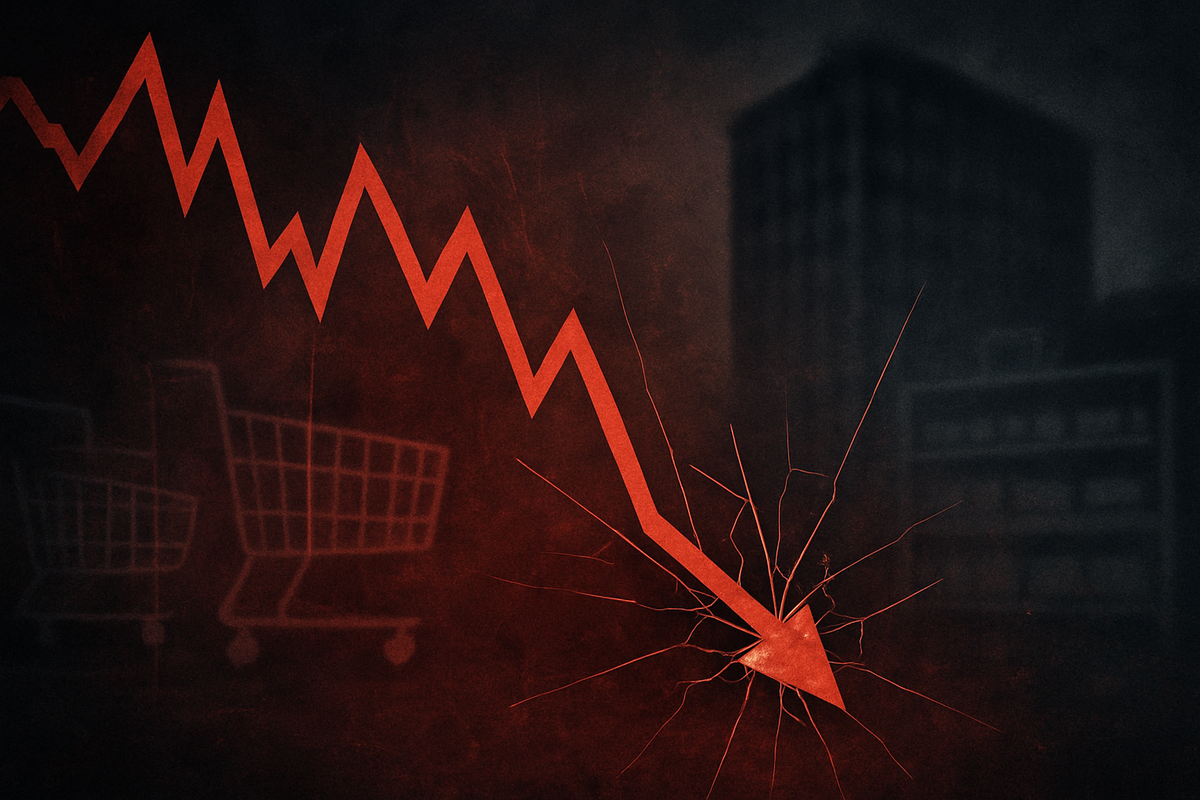Financial News
Future Group Stocks in a Freefall: Extreme Volatility Signals Deepening Crisis

The Indian financial markets are currently witnessing unprecedented volatility in the shares of Future Group entities, particularly Future Enterprises Ltd (NSE: FEL) and Future Consumer Ltd (NSE: FCL). Both stocks have been caught in a relentless cycle of hitting daily circuit limits, oscillating between upper and lower bands, a clear indicator of severe financial distress and heightened investor uncertainty surrounding the once-prominent retail conglomerate. This extreme price action reflects a market grappling with the fallout of ongoing insolvency proceedings and a precarious future for these companies.
The recent movements underscore a critical juncture for the Future Group, as its constituent companies battle significant debt and legal challenges. For investors, these rapid price swings represent both a high-risk gamble and a stark warning about the health of the broader retail sector and the implications of corporate defaults. The immediate implication is a severe erosion of shareholder wealth and a challenging environment for creditors attempting to recover their dues.
Unpacking the Rollercoaster Ride: A Detailed Look at Future Group's Market Turmoil
The recent weeks and months have been particularly brutal for shareholders of Future Enterprises Ltd (NSE: FEL) and Future Consumer Ltd (NSE: FCL). Future Enterprises, for instance, plunged to new all-time lows, hitting its lower circuit limit on November 8, 2025, closing at a mere Rs 0.4, following a similar dive on November 7, 2025, at Rs 0.41. These sharp declines follow earlier instances in July 2025 where the stock briefly touched upper circuit limits at Rs 0.60, only to resume its downward trajectory, indicating a sustained bearish trend. The stock consistently trades below all key moving averages, signaling persistent selling pressure.
The timeline of distress for Future Enterprises is deeply intertwined with its Corporate Insolvency Resolution Process (CIRP). Throughout 2025, the company has made numerous announcements regarding its CIRP, with significant updates in August, July, and June. A critical development includes a second insolvency plea filed by an operational creditor, Retail Detailz India, before the National Company Law Tribunal (NCLT) for an alleged default of Rs 4.02 crore. This follows the September 26, 2024, admission of four other Future Group companies into insolvency proceedings due to hundreds of crores in loan defaults, casting a long shadow over the entire group.
Future Consumer Ltd (NSE: FCL) has mirrored this erratic behavior. The stock hit an all-time low of INR 0.38 on October 19, 2025, and a new 52-week low of Rs 0.44 around the same period. While it saw a 5.00% increase on November 3, 2025, suggesting a temporary upper circuit, its trading has been highly erratic, with the stock not trading on several days, indicative of being locked in circuit limits. The primary catalyst for FCL's volatility is an insolvency petition filed by Resurgent India Special Situations Fund at the NCLT on August 20, 2025, for defaulting on loans amounting to ₹558.73 crore. The company's June 2025 results revealed severe cash flow problems and missed loan payments, further exacerbating investor concerns.
Key players in this unfolding drama include the Future Group companies themselves, their numerous operational and financial creditors (such as banks and funds like Resurgent India Special Situations Fund), and regulatory bodies like the NCLT overseeing the insolvency processes. The initial market reaction has been overwhelmingly negative, with investors liquidating their holdings, leading to the observed circuit limit movements and a general erosion of confidence in the group's ability to navigate its financial quagmire. The broader market sentiment remains cautious, especially given the intertwined nature of Future Group's various entities and the precedent set by the stalled ₹24,713 crore deal with Reliance Retail Ventures Ltd (NSE: RELIANCE).
The Ripple Effect: Winners and Losers in the Future Group Saga
The extreme volatility and ongoing insolvency proceedings surrounding Future Group companies like Future Enterprises (NSE: FEL) and Future Consumer Ltd (NSE: FCL) create a clear distinction between potential winners and significant losers. At the forefront of the losing side are the existing shareholders of both companies. Their investments have been severely diluted, with stock prices plummeting to fractions of their former value, as evidenced by FEL trading at Rs 0.4 and FCL at similar distressed levels. Retail investors, in particular, who might have held onto these stocks hoping for a revival, face substantial, if not total, capital loss.
The financial creditors, including banks and institutional lenders such as Resurgent India Special Situations Fund, are also significant losers in the short term, as they face substantial delays and potential haircuts on their outstanding loans. While the insolvency process aims to maximize asset recovery, the protracted legal battles and the distressed nature of the assets often mean creditors retrieve only a portion of their original investment. Operational creditors, like Retail Detailz India, who have filed insolvency pleas, also bear the brunt of delayed payments and the uncertainty of recovery through the NCLT process.
On the other hand, potential winners could emerge from the distressed asset market. Entities specializing in acquiring and restructuring financially troubled companies or their assets might find opportunities. Should the insolvency proceedings lead to liquidation or piecemeal sale of assets, stronger, well-capitalized players in the retail or logistics sectors could potentially acquire valuable infrastructure, brands, or real estate at significantly discounted prices. This could include competitors looking to expand their market share or new entrants seeking to establish a foothold.
Furthermore, legal and financial advisory firms specializing in insolvency and corporate restructuring are likely to benefit from the extensive legal and administrative work required for the CIRP. These firms play a crucial role in navigating the complex regulatory landscape, preparing resolution plans, and facilitating asset sales, thereby securing significant fees for their expertise in handling such large-scale corporate distress. The current situation, therefore, while devastating for many, presents strategic opportunities for others adept at navigating the turbulent waters of corporate insolvency.
Broader Implications: A Bellwether for India's Retail and Debt Markets
The severe financial distress and extreme stock volatility witnessed in Future Group companies like Future Enterprises (NSE: FEL) and Future Consumer Ltd (NSE: FCL) are not isolated incidents; they serve as a critical bellwether for broader industry trends within India's retail sector and the nation's debt markets. This event highlights the immense challenges faced by traditional brick-and-mortar retailers in an increasingly competitive landscape dominated by e-commerce giants and well-funded conglomerates. The inability of the Future Group to adapt, coupled with its aggressive expansion fueled by debt, has exposed vulnerabilities that could resonate across other heavily leveraged retail players.
The ripple effects extend to competitors and partners. While the demise of a major player like Future Group could theoretically create a vacuum for rivals to fill, it also sends a cautionary signal about the operational complexities and capital intensity of the retail business. Partners, including suppliers, landlords, and logistics providers, who were heavily reliant on Future Group's extensive network, face immediate business disruption and potential payment defaults. This forces them to diversify their client base and reassess credit risks within the sector.
From a regulatory and policy standpoint, the Future Group saga underscores the efficacy and limitations of India's insolvency and bankruptcy code (IBC). The ongoing NCLT proceedings, while providing a structured mechanism for debt resolution, also highlight the time-consuming nature and complexities involved, particularly for large, multi-entity conglomerates. Regulators might scrutinize lending practices to the retail sector more closely, and there could be calls for faster resolution mechanisms to prevent prolonged uncertainty that erodes asset value. The situation also brings into focus corporate governance standards and the need for robust financial oversight to prevent excessive leverage.
Historically, the Indian market has seen several instances of large business groups facing similar financial collapses, often due to over-leveraging, poor management, or an inability to adapt to changing market dynamics. The Essar Steel and Jet Airways cases, for instance, offer precedents of how complex insolvency proceedings can be and the eventual outcomes for creditors and shareholders. The Future Group crisis, however, stands out due to its direct impact on the consumer retail space, a sector deeply intertwined with public sentiment and daily life, making its resolution a closely watched event for both financial markets and the general public.
What Comes Next: Navigating the Uncertain Future
The path forward for Future Enterprises (NSE: FEL) and Future Consumer Ltd (NSE: FCL), and indeed the remnants of the Future Group, remains highly uncertain, characterized by a complex interplay of legal, financial, and market forces. In the short term, the immediate focus will be on the ongoing Corporate Insolvency Resolution Process (CIRP) for both entities. Investors should closely monitor NCLT proceedings, particularly any announcements regarding the appointment of Resolution Professionals, the submission of claims by creditors, and the eventual consideration of resolution plans. Any significant legal developments, such as the admission of new insolvency pleas or the rejection of existing ones, could trigger further extreme volatility in their stock prices.
Long-term possibilities include the potential liquidation of assets if no viable resolution plan is approved. This could see the piecemeal sale of brands, real estate, and other tangible assets to recover creditor dues. Alternatively, a white knight investor or consortium might emerge with a restructuring plan, though this seems less likely given the current deep financial distress and the failure of previous attempts, such as the Reliance Retail deal. The outcome will largely depend on the perceived value of the remaining assets and the willingness of creditors to accept significant haircuts to facilitate a revival.
Potential strategic pivots for any surviving entities or acquired assets would likely involve a leaner operational model, a renewed focus on profitability over aggressive expansion, and a clear strategy to address the changing retail landscape. This might necessitate shedding non-core businesses and concentrating on niche segments where they can achieve sustainable competitive advantages. Market opportunities could emerge for competitors to capture market share left vacant by Future Group's contraction, especially in specific retail categories or geographic regions.
Potential scenarios range from complete delisting and liquidation of both FEL and FCL, resulting in total loss for equity shareholders, to a highly improbable but still possible restructuring that allows a much smaller, reorganized entity to emerge. Investors should prepare for continued turbulence and exercise extreme caution. The primary challenge remains the overwhelming debt burden and the lack of a clear, executable strategy for sustainable operations.
Comprehensive Wrap-Up: A Cautionary Tale in Indian Retail
The extreme volatility and ongoing insolvency of Future Group companies, particularly Future Enterprises (NSE: FEL) and Future Consumer Ltd (NSE: FCL), stand as a stark and cautionary tale within the Indian financial markets. The relentless circuit limit movements and the persistent decline in stock values underscore the severe consequences of aggressive debt-fueled expansion, coupled with an inability to adapt to evolving market dynamics and intense competition. The key takeaway from this unfolding crisis is the fragility of even large conglomerates when faced with overwhelming financial liabilities and a challenging operational environment.
Moving forward, the market will undoubtedly assess the broader implications of this event on the Indian retail sector. It highlights the imperative for robust corporate governance, prudent financial management, and a realistic appraisal of growth strategies. The protracted nature of the insolvency proceedings also emphasizes the need for efficiency within the legal framework to ensure timely resolution and value maximization for all stakeholders. The crisis reinforces the notion that past successes do not guarantee future performance, especially in rapidly changing industries.
The lasting impact of the Future Group saga will likely be multifold. It will serve as a case study for business schools on corporate distress, a reminder to investors about the risks associated with highly leveraged companies, and a catalyst for increased scrutiny by lenders and regulators on the financial health of large corporate groups. The narrative also underscores the shift in India's retail landscape, where traditional models are being challenged by digital innovation and consolidation.
For investors, the coming months will require vigilance. Monitoring the progress of insolvency proceedings at the NCLT for both Future Enterprises and Future Consumer will be paramount. Any announcements regarding asset sales, creditor settlements, or potential resolution plans will be critical. However, given the current state of affairs, the outlook for equity shareholders remains extremely bleak. The Future Group's journey from a retail powerhouse to a company battling for survival offers crucial lessons for the entire market, emphasizing resilience, adaptability, and financial prudence as indispensable virtues in the volatile world of business.
This content is intended for informational purposes only and is not financial advice
More News
View More




Recent Quotes
View MoreQuotes delayed at least 20 minutes.
By accessing this page, you agree to the Privacy Policy and Terms Of Service.



